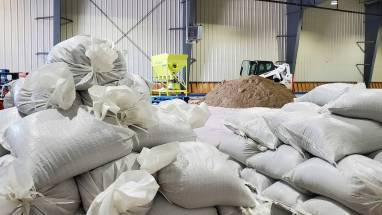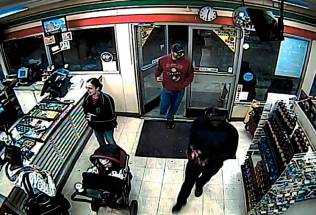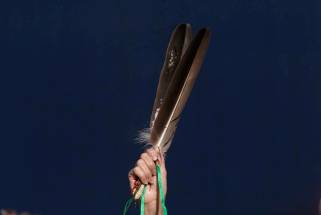Winnipeg siblings add voices to Holocaust remembrance
Read this article for free:
or
Already have an account? Log in here »
To continue reading, please subscribe:
Monthly Digital Subscription
$0 for the first 4 weeks*
- Enjoy unlimited reading on winnipegfreepress.com
- Read the E-Edition, our digital replica newspaper
- Access News Break, our award-winning app
- Play interactive puzzles
*No charge for 4 weeks then price increases to the regular rate of $19.00 plus GST every four weeks. Offer available to new and qualified returning subscribers only. Cancel any time.
Monthly Digital Subscription
$4.75/week*
- Enjoy unlimited reading on winnipegfreepress.com
- Read the E-Edition, our digital replica newspaper
- Access News Break, our award-winning app
- Play interactive puzzles
*Billed as $19 plus GST every four weeks. Cancel any time.
To continue reading, please subscribe:
Add Free Press access to your Brandon Sun subscription for only an additional
$1 for the first 4 weeks*
*Your next subscription payment will increase by $1.00 and you will be charged $16.99 plus GST for four weeks. After four weeks, your payment will increase to $23.99 plus GST every four weeks.
Read unlimited articles for free today:
or
Already have an account? Log in here »
Hey there, time traveller!
This article was published 26/04/2022 (1324 days ago), so information in it may no longer be current.
One of the oldest living groups of Holocaust survivor siblings have called Winnipeg home for decades. Now, they are sharing their stories, via the Last Chance Testimony Collection, part of the University of Southern California Shoah Foundation’s Visual History Archive.
The race-against-time initiative was launched in 2019 to preserve the memories of the last remaining survivors.
Sally Singer, 100, Anne Novak, 99, Sol Fink, 97, and Ruth Zimmer, 95, grew up in Poland, along with younger brother Eli and parents Shaindel and Zecharia Fink.
When the Nazis invaded that country Sept. 1, 1939, the family fled to their grandparents’ town 21 kilometres away.
When that community fell under Soviet control in 1940, they and other Polish Jews were arrested and sent to Siberia by train in cattle cars. Eli, however, managed to escape back to his grandparent’s house.
After a month of travelling, the family arrived in Siberia. They were given a tiny room in a barracks and forced to work in a nearby forest, felling trees.
Novak remembers the cold.
“We worked very hard in the forest,” she said in a recent interview, recalling one -30 C day when her legs began to freeze.
“We were told: if we leave work, we will be arrested and put in jail for a year. But I asked myself: ‘Should I die here or go to jail?’ I decided to leave and walk home.”
When she got to their flimsy shelter, her legs were swollen. “But nobody caught me.”
“We were told: if we leave work, we will be arrested and put in jail for a year. But I asked myself: ‘Should I die here or go to jail?’ I decided to leave and walk home.”
– Anne Novak
Zimmer recalls being hungry.
“I would sometimes cry all night from the hunger pains,” she said. “Our family of six would share two pieces of bread. That’s the way it was.”
She also remembers people dying, like a man walking between the barracks who just fell down. “He dropped dead from hunger,” she said.
When the Nazis invaded the Soviet Union in June 1941, Moscow freed the Finks and other Jewish prisoners. The family moved to a nearby village, where they lived in a cramped cottage with a small garden and were forced to work on a communal farm.
With little in the way of warm clothing, they still suffered from the cold. That included having only one pair of boots between them; whoever was going outside got to wear them, Zimmer recalled.
There was always a shortage of food; seeds from some kindly Russian neighbours enabled them to plant a garden each year for something extra to eat, she said.
“I would sometimes cry all night from the hunger pains. Our family of six would share two pieces of bread. That’s the way it was.”
– Ruth Zimmer
When the war ended in 1945, the Finks returned to Poland to discover their brother Eli was murdered in a Nazi death camp, along with their grandparents. In all, about 80 members of their extended family were killed during the Holocaust.
From Poland, they went moved around Europe before coming to Canada.
Zimmer recalls her father dropping to his knees and kissing the ground when they got off the train at the train station in Winnipeg: “Thank God, we are finally here.”
Today, the three sisters — all widows — remain close, living in the same assisted living residence in Winnipeg. They meet regularly with their brother and his wife, who live nearby.
Singer’s story was already in the foundation’s archive, from a 1988 interview for the Freeman Family Foundation Holocaust Education Centre at the Jewish Heritage Centre of Western Canada.
In December, Sol Fink and Zimmer recorded their stories; Novak recorded hers in March.
“We want people to know what happened,” said Zimmer, adding she is particularly interested in making sure youth know about the Holocaust.
She also wants to make sure their story is there to counter those who deny the Holocaust. “It happened,” Zimmer said matter-of-factly. “We know the truth.”
Novak feels the same way. “I want people to know about it… It was a very hard time.”
For Belle Jarniewski, heritage centre executive director, “The age-defying resilience and strength of these siblings as well as their close-knit relationship is so inspiring.”
She is especially grateful “for their understanding of the importance of sharing their stories for generations to come and their willingness to record these difficult experiences.”
Marilyn Sinclair, who is leading the Shoah Foundation’s Last Chance Canada effort, added: “Having four siblings talk about their experience gives us an incredible chance to hear a story from different perspectives… We feel like we have found a treasure, that they are still sharp and eager to share their stories.”
As they look to this year’s Yom HaShoah (Holocaust Remembrance Day) on April 27-28, Zimmer said: “We survived. And we aren’t finished with life yet.”
faith@freepress.mb.ca
The Free Press is committed to covering faith in Manitoba. If you appreciate that coverage, help us do more! Your contribution of $10, $25 or more will allow us to deepen our reporting about faith in the province. Thanks! BECOME A FAITH JOURNALISM SUPPORTER

John Longhurst has been writing for Winnipeg's faith pages since 2003. He also writes for Religion News Service in the U.S., and blogs about the media, marketing and communications at Making the News.
Our newsroom depends on a growing audience of readers to power our journalism. If you are not a paid reader, please consider becoming a subscriber.
Our newsroom depends on its audience of readers to power our journalism. Thank you for your support.
The Free Press acknowledges the financial support it receives from members of the city’s faith community, which makes our coverage of religion possible.







